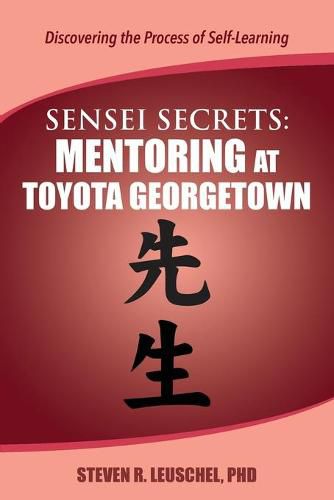Readings Newsletter
Become a Readings Member to make your shopping experience even easier.
Sign in or sign up for free!
You’re not far away from qualifying for FREE standard shipping within Australia
You’ve qualified for FREE standard shipping within Australia
The cart is loading…






This title is printed to order. This book may have been self-published. If so, we cannot guarantee the quality of the content. In the main most books will have gone through the editing process however some may not. We therefore suggest that you be aware of this before ordering this book. If in doubt check either the author or publisher’s details as we are unable to accept any returns unless they are faulty. Please contact us if you have any questions.
This study examines the developmental interactions between Japanese senseis (mentors) and early American leaders at Toyota Motor Manufacturing Kentucky (TMMK). More specifically, this study examines why and how these early American leaders transitioned from the initiation phase of a mentor relationship to the active and transforma- tional participation of the cultivation phase. This research identifies characteristics of developmental interactions so that other leaders and mentors can effectively adapt Toyo- ta-style management practices and thinking.
Though the professionalization of Toyota Production Systems (TPS), also known as lean manufacturing, or sim- ply lean, has proven to be vast, the success rate of emula- tion and adaptation of sustained TPS has been low. One of the many problems that organizations face when adapting TPS is executive resistance and misunderstanding of lean management and leadership (Emiliani, 2018; Sherman, 1994). Toyota faced a similar problem of resistance when it hired leaders from other automotive companies into Toyota during the initial years at TMMK. Understanding how Toy- ota overcame this resistance offers insight into better mento- ring for adapting TPS.
This study performs qualitative interviews using oral history and grounded theory techniques. It specifically identifies characteristics of the transition from the initiation to cultivation phases of mentor relationships within TMMK from 1986 to 1992. This research illustrates how leaders who never before experienced the Toyota culture experienced transformation within mentor relationships, which enabled them to adopt Toyota’s frame of reference for solving prob-lems and ultimately Toyota’s culture. The findings may prove adaptable and beneficial for other leaders and execu- tives adopting TPS.
$9.00 standard shipping within Australia
FREE standard shipping within Australia for orders over $100.00
Express & International shipping calculated at checkout
This title is printed to order. This book may have been self-published. If so, we cannot guarantee the quality of the content. In the main most books will have gone through the editing process however some may not. We therefore suggest that you be aware of this before ordering this book. If in doubt check either the author or publisher’s details as we are unable to accept any returns unless they are faulty. Please contact us if you have any questions.
This study examines the developmental interactions between Japanese senseis (mentors) and early American leaders at Toyota Motor Manufacturing Kentucky (TMMK). More specifically, this study examines why and how these early American leaders transitioned from the initiation phase of a mentor relationship to the active and transforma- tional participation of the cultivation phase. This research identifies characteristics of developmental interactions so that other leaders and mentors can effectively adapt Toyo- ta-style management practices and thinking.
Though the professionalization of Toyota Production Systems (TPS), also known as lean manufacturing, or sim- ply lean, has proven to be vast, the success rate of emula- tion and adaptation of sustained TPS has been low. One of the many problems that organizations face when adapting TPS is executive resistance and misunderstanding of lean management and leadership (Emiliani, 2018; Sherman, 1994). Toyota faced a similar problem of resistance when it hired leaders from other automotive companies into Toyota during the initial years at TMMK. Understanding how Toy- ota overcame this resistance offers insight into better mento- ring for adapting TPS.
This study performs qualitative interviews using oral history and grounded theory techniques. It specifically identifies characteristics of the transition from the initiation to cultivation phases of mentor relationships within TMMK from 1986 to 1992. This research illustrates how leaders who never before experienced the Toyota culture experienced transformation within mentor relationships, which enabled them to adopt Toyota’s frame of reference for solving prob-lems and ultimately Toyota’s culture. The findings may prove adaptable and beneficial for other leaders and execu- tives adopting TPS.